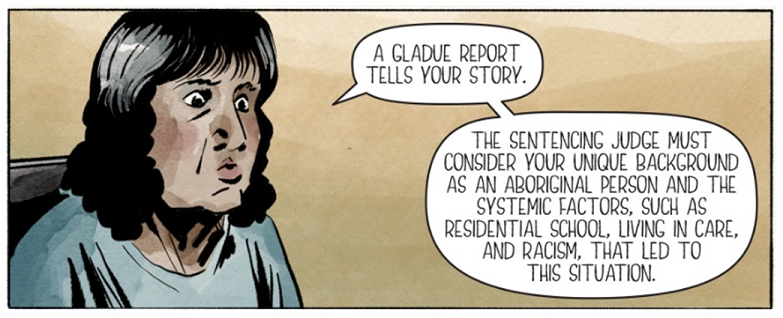
Gladue Principles apply to Indigenous Peoples in Canada, who are:
- First Nations (Status and Non-Status)
- Inuit
- Métis
- Living On or Off Reserve
What is the Gladue Decision?
In Canada, Indigenous people are put in jail more often than non-Indigenous people as a result of colonialism and systemic discrimination. In 1996, the Government of Canada changed the law to ask that judges approach the sentencing of Indigenous people differently because of their unique circumstances.
In 1999, the Supreme Court of Canada interpreted this change to law in the Gladue Decision, and again in following decisions. They stated that Gladue requires judges change their approach in dealing with Indigenous people, which includes considering Indigenous ways of healing and wellbeing, worldviews, legal traditions, customs, and responses to crime. Recognizing Gladue Principles and addressing the root causes of crime (i.e., poverty, addictions, housing insecurity, etc.) through restorative options are ways that courts can help address the high rates of imprisonment for Indigenous peoples.
Whenever an Indigenous person is sentenced for a crime or asks for release on bail, the judge has a responsibility to consider their personal and background circumstances that relate to their experiences as an Indigenous person. These are called their Gladue Factors. There are many ways lawyers and judges must consider an Indigenous person’s Gladue Factors when they are being sentenced or they are asking for release on bail. The ways in which the Gladue Factors are considered by judges and lawyers are called the Gladue Principles.
The fact that an Indigenous person lives in an urban centre, in a rural community, on a reserve, or anywhere else does not impact the Gladue Principles, or their right to a Gladue Report or Gladue Submission. Gladue Principles apply to every First Nations, Inuit, and Métis person in Canada, regardless of where they live.
Gladue Factors
Some of an Indigenous Person's Gladue Factors may be unique challenges that they have faced, or that their family, community, or Nation has faced (known as systemic and background factors). These relate to the harmful effects of colonialism and discrimination, both past and present. They can include personal or family attendance at Residential or Day School, being forced to leave one’s community or homelands, experiences of racism, placement in foster care, and many other factors that may have impacted an Indigenous person, their family, their Nation, and/or their community.
The judge must also consider the different options available to an Indigenous person such as alternatives to jail. Some options might be more appropriate for an Indigenous person based on their cultural heritage or connection to an Indigenous Nation or community. The judge may need to consider the culture, traditions, and laws of the Indigenous person’s family, community, and/or Nation.
Gladue Factors are normally presented through a Gladue Submission or Gladue Report.
- Gladue Submissions and Gladue Reports
-
Gladue Factors are presented through a Gladue Submission or Report. This type of report can help explain to a judge the personal circumstances of an Indigenous person and tries to answer the questions:
- How did this person get to this point in their life?
- Are there appropriate options other than sending this person to jail?
Gladue Submissions
A Submission is less detailed than a Report, but both aim to present an Indigenous person’s Gladue Factors to the court and identify potential appropriate alternatives to jail. In Saskatchewan, Gladue Submissions are more commonly used than Gladue Reports. Individuals may experience cost barriers accessing a Gladue Report when a court is unwilling to order the preparation of one. Gladue Submissions can be used to lessen the cost and wait time frequently needed to complete a full Gladue Report.
Gladue Reports
Gladue Reports have the advantage of presenting the rich and detailed story of an Indigenous person’s life, family, community and/or Nation. A Gladue Report can explore, in depth, the reasons why they are before the court. Gladue Reports are usually written by a Gladue Report Writer. Other provinces and territories have their own processes, wait times, and agencies for submitting Gladue Reports to the court, each taking various approaches. No jurisdiction is exactly the same.
- Public Research Guide
-
- Gladue Submission Guide for Indigenous Clients and Lawyers - Legal Aid Saskatchewan
- Gladue and You Brochure - Legal Aid Saskatchewan
- A Gladue report changed his life. Like many marginalized offenders, he didn't know it was his right (video) - CBC Saskatchewan
- Know Your Gladue Rights (video) - International Centre for Criminal Law Reform and Criminal Justice Policy
- Timeline of Colonialism in the West
- Gladue Sentencing Principles: Training Resource, National Aboriginal Court Worker Program
- R v. Gladue 1999: Summary
- R v. Ipeelee 2012: Summary
